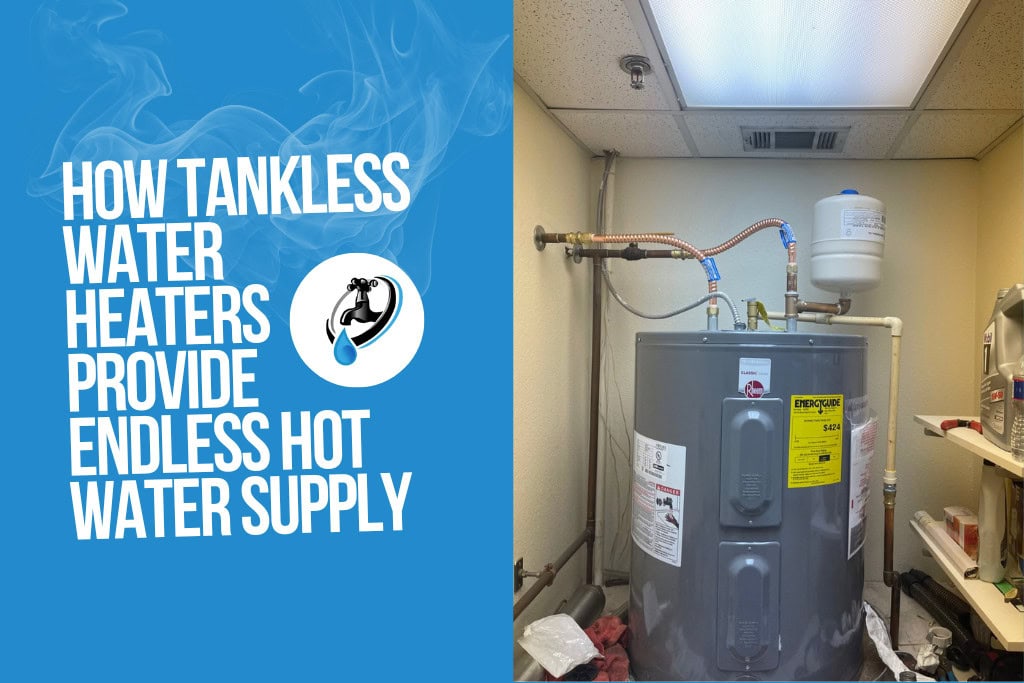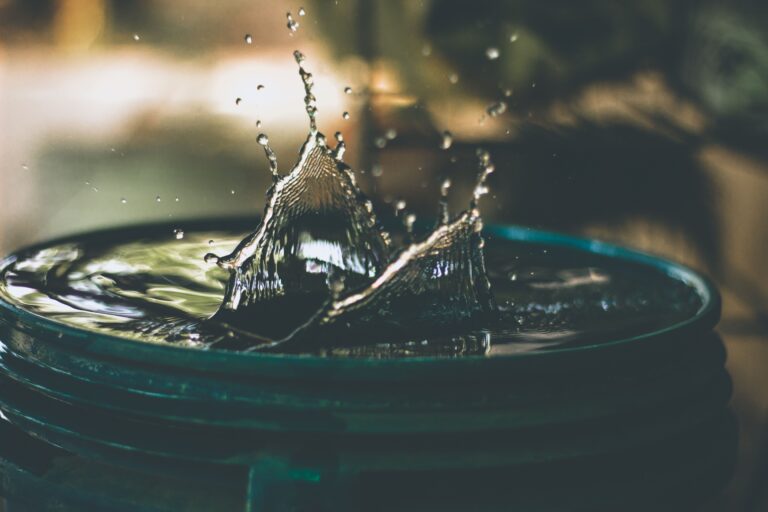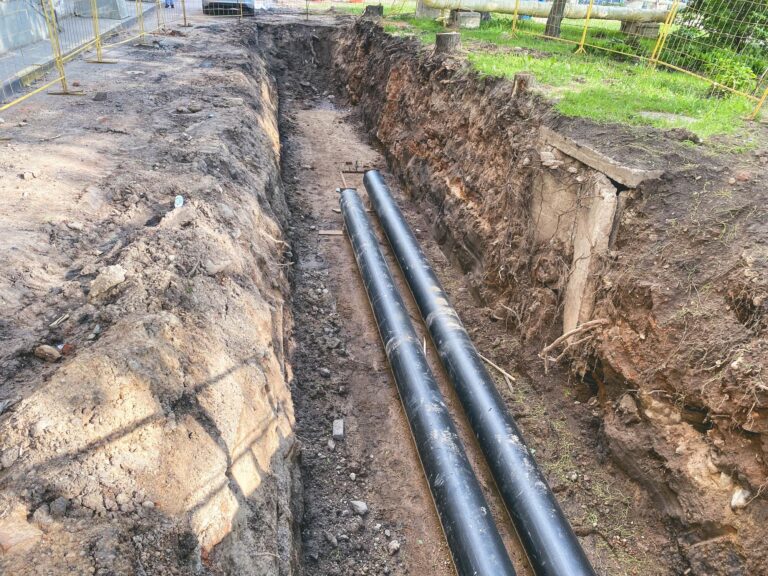How Tankless Water Heaters Provide Endless Hot Water Supply
Fed up with the hot water turning cold just when you need it more than ever? You’re not alone. In a time when comforts and conveniences reign supreme, the traditional water heater simply isn’t doing the trick anymore. That’s why an increasing number of homeowners are making the savvy switch to tankless water heater installation — a decision that guarantees one thing loud and crystal clear: a continuous supply of hot water to order.
Picture a home where consecutive showers, dish-washing and laundry do not compete for limited hot water. Where you never again have to wait for a tank to refill or try to schedule yet another water heater repair because your unit just won’t keep up. With tankless water heater — it’s not just hot-water that you replace — it’s your lifestyle that you upgrade.
This isn’t just a trend. It’s the future of home heating — and it’s not going anywhere. In this blog, we will discuss how tankless water heaters provide an endless supply of hot water, why they are changing the way we think about energy usage, how to maintain them, and what to do when you need a tankless water heater repair or replacement.
Let’s explore the tankless tech behind this and see why going tankless means never going cold again.
What Is a Tankless Water Heater and What Does It Do?

A tankless water heater (also called an on-demand water heater) only heats the water when you need it. Unlike conventional tank-based systems that heat and store a finite amount of water during the day, tankless models are designed to heat water on the spot, providing ongoing access to hot water.
Here’s how it works:
Mechanism – Water Flow Activation – When you turn on a hot water tap, cold water flows into the unit.
Instant Heating – A strong gas burner or an electric heating element heats the water as it flows through the system.
Endless Delivery – The unit continues to heat water as long as it flows through, giving you endless hot water with no waiting or limits from a storage tank.
Benefits of Tankless Water Heater Systems
Endless Hot Water, Anytime
Say goodbye to cold showers. A correctly sized tankless unit can keep up with multiple fixtures running at one time—ideal for large families or busier households. That’s one of the primary reasons tankless water heater installation has skyrocketed.
Greater Energy Efficiency
Conventional tanks continue to heat water whether or not you need it, wasting energy. Tankless systems only heat water on demand, cutting energy consumption by as much as 35%. This is one reason why so many eco-conscious homeowners are switching to tankless.
Compact, Space-Saving Design
Hefty tanks consume precious real estate. Tankless water heaters can be sleek, wall-mounted units perfect for small homes, apartments, or cramped utility areas.
Longer Lifespan
Tankless units can last 20+ years compared to tanks’ average 10-15 year lifespan. And with proper care and tankless water heater repair when needed, you can stretch that longevity even further.
Reduced Risk of Water Damage and Leaks
Without a tank to burst or corrode, you greatly reduce the risk of catastrophic leaks. That’s one less reason to need an emergency water heater repair.
Installation Insights: What To Expect

When it comes to professional tankless water heater installation, one of the first things to do is to select the size and model that best meet your needs. First of all, it is determined by your residential water use, the number of fixtures, and on the climate.
The Installation Process Includes:
- Removing the old tank heater
- Installing new gas lines or upgrading electrical systems
- Setting up proper ventilation (for gas units)
- Mounting the tankless unit on the wall
- Connecting water lines and running diagnostics
It usually takes 1–2 days to perform the installation and it is advisable to have a qualified technician do the job in order to get assured of efficiency and code compliance.
Choosing the Right Size of a Tankless Water Heater
The key to getting unlimited hot water is by choosing the correct size for your machine. The system, if wrong in size, will hardly be able to keep up with your demand or too much of which can cause energy to be squandered.
Correctly Sizing a Tankless Water Heater
The key to amazing endless hot water is properly sizing your unit. If a unit is too small, you won’t have enough hot water and, if it’s too large, you’ll waste energy.
Some major considerations are;
- The amount of bathrooms
- Number of residents
- The simultaneous water uses (shower + laundry + dishwasher)
- Water temperature in your geographic area
To ensure your tankless water heater fits your lifestyle, the best option is to have an expert in tankless water heater installation consultation.
Common Myths Debunked
Myth 1: Tankless water heaters provide hot water instantly.
Fact: While they start heating instantly, it may take a few seconds for the hot water to reach your tap—just like traditional systems.
Myth 2: They don’t work well for large homes.
Fact: A properly sized or multi-unit setup can handle even high-demand households effortlessly.
Myth 3: They’re too expensive.
Fact: While upfront costs are higher, long-term savings on energy bills and fewer water heater repair needs make them cost-effective.
Keeping Your Tankless System in the Best Shape Possible

Just like any appliance, it is important to have your tankless water heater maintained to keep it working at peak performance and get the longest life out of it.
Maintenance Suggestions-
Your tankless water heater should be flushed annually to remove minerals and residues (especially if you live in an area with hard water).
- Regularly clean the air and water filters.
- Check the venting and electrical wiring for signs of wear.
- Have a qualified technician inspect your water heater once a year.
If you neglect the listed maintenance suggestions, you can expect performance issues which will lead to calls for repair service for your tankless water heater. So keep your tankless water heater in good shape.
Troubleshooting Common Repairs
Even with good practices, your system may need work occasionally. If you see any of the following, it may be time to call for service to your tankless water heater.
- No hot water whatsoever
- Water temperature fluctuates
- Displays an error code
- Water pressure has decreased
- Unusual sounds or smells
A professional technician can identify any issues quickly and perform the needed repairs, anywhere from replacing heating elements to clearing the vents that may be blocked.
When to Replace Your Old Heater with a Tankless Model
Are you still holding onto your old tank system? Find out when it’s time to replace hot water systems with a tankless model:
- Your current system is more than ten years old
- Run out of hot water frequently
- You have needed a water heater repair more than twice in a year
- Your bills continue to increase
- Have rusty water or a leak from the tank
By switching now you will have better energy efficiency, less repairs, and never run out of hot water again.n.
Here is the breakdown of costs:
Upfront costs:
- Tankless water heater: $800 – $2,500
- Installation: $800 – $3,000 (depending on complexity)
Long-term savings:
- 20%–35% reduction in energy costs
- Minimal maintenance compared to tank systems
- Less trouble with water heater repairs
Incentives:
- Energy-efficiency rebates
- Some states also offer tax credits
Insurance premiums are usually lower because of reduced risk for water damage
So while the cost to buy and install a tankless water heater is higher, the return on comfort, convenience, and savings is worth it.
Eco-Friendly & Smart Home Ready
Tankless heaters aren’t just efficient—they’re smart. Many now feature Wi-Fi connectivity, mobile apps, usage tracking, and even auto-shutoff safety features. Add in the fact that you’ll use less energy, resulting in a lower carbon footprint—that’s good for your pocket and the planet!
Choosing the Right Professional for Installation or Repair
- To make sure your system operates seamlessly:
- Always hire a licensed and insured contractor
- Ask if they have experience installing tankless water heaters
- Review their references and read reviews
- Ask about warranty coverage on both labor and equipment
The right professional will not only install your unit; they will help you maximize its benefits for years to come.
The Future Is Tankless!
The days of running out of hot water are no more. With a tankless water heater, endless hot water, lower energy bills, and simplified plumbing for decades can all be achieved. From new builds to replacing aging tanks, the benefits of having a tankless water heater installed are obvious—and the peace of mind? To be held in the highest esteem.
Whether you’re doing part replacements with hot water systems, attempting to avoid ongoing water heater repair costs, or simply bringing your home into the present day, it’s time to ditch the tank. Because comfort shouldn’t come with compromises—and your hot water shouldn’t run out when you need it.








